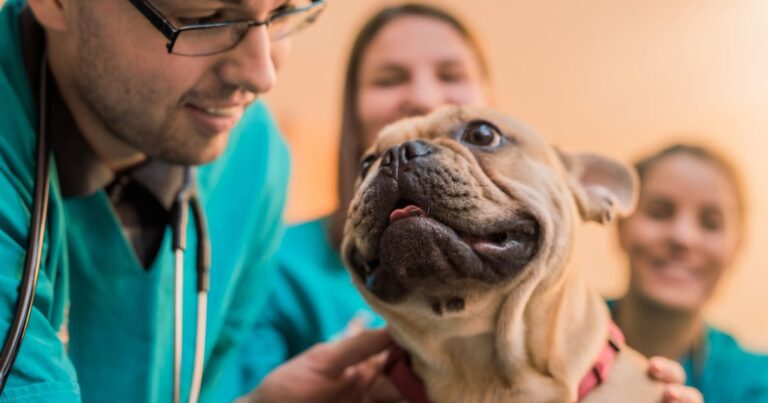French Bulldog Gastrointestinal Issues
Table of Contents
French Bulldog Gastrointestinal Issues
| Issue | Symptoms | Treatment |
|---|---|---|
| Indigestion | Vomiting, diarrhea, loss of appetite | Dietary changes, medication |
| Food Allergies | Itchy skin, ear infections, gastrointestinal upset | Allergy testing, dietary changes |
| Inflammatory Bowel Disease (IBD) | Chronic diarrhea, vomiting, weight loss | Dietary changes, medication |
| Megaesophagus | Regurgitation, difficulty swallowing | Dietary changes, feeding modifications |
Ever had a tummy ache that made you wish you hadn’t eaten that second slice of pizza? Well, our French Bulldog friends can have similar woes. Dive into this guide to understand French Bulldog gastrointestinal issues and how to keep your Frenchie’s tummy happy!
Introduction
If you’re a proud parent of a French Bulldog, you know that these adorable companions can sometimes have sensitive stomachs, leading to various gastrointestinal issues. From indigestion to food allergies, French Bulldogs can experience a variety of digestive problems that require careful attention and management. In this comprehensive guide, we’ll delve into the world of French Bulldog gastrointestinal issues, providing you with the knowledge you need to ensure your furry friend’s digestive health.

The road to a French Bulldog’s heart is through its stomach, but that road can sometimes be a bit bumpy. Understanding your Frenchie’s digestive health is key to keeping them happy and healthy.
Understanding Digestion in French Bulldogs
To fully grasp the nature of gastrointestinal issues in French Bulldogs, it’s essential to first understand their unique digestive system. Like all dogs, French Bulldogs have a digestive system designed to process meat and other foods. However, due to their compact size and brachycephalic nature, French Bulldogs can be more prone to certain digestive issues than other breeds. Understanding how their digestive system works can help you identify potential problems early and take the necessary steps to address them.
Signs Your French Bulldog May Have a Digestive Issue
- Loss of appetite
- Vomiting
- Diarrhea
- Excessive gas
- Changes in stool consistency or color
Are French Bulldogs prone to digestive problems?
French Bulldogs, like other breeds, can experience a range of gastrointestinal problems, each with its own set of symptoms and treatments. Some of these issues can be mild and easily managed, while others can be more serious, requiring veterinary intervention. Common digestive problems in French Bulldogs include indigestion, food allergies, and more serious conditions like Inflammatory Bowel Disease (IBD) or Megaesophagus. It’s important to be aware of these potential issues so you can spot any signs of trouble early on.
Common Food Allergens in French Bulldogs
| Food Allergen | Symptoms | Alternatives |
|---|---|---|
| Chicken | Skin irritation, gastrointestinal upset | Duck, fish |
| Beef | Skin irritation, gastrointestinal upset | Lamb, fish |
| Dairy | Gastrointestinal upset, skin irritation | Non-dairy alternatives |
| Grains | Gastrointestinal upset, skin irritation | Grain-free diet |
How can I settle my French Bulldog’s stomach?
If your French Bulldog is experiencing a mild upset stomach, there are a few things you can do to help settle it. First, ensure your Frenchie has access to plenty of fresh water to prevent dehydration. You might also consider feeding them a bland diet of boiled chicken and rice until their symptoms improve. However, if your French Bulldog’s symptoms persist or worsen, it’s important to seek veterinary care as soon as possible. Your vet can provide a proper diagnosis and treatment plan to help your Frenchie feel better.
Tips for Settling Your French Bulldog’s Stomach
- Provide plenty of fresh water
- Feed a bland diet of boiled chicken and rice
- Avoid giving any treats or human food
- Allow for plenty of rest
- Seek veterinary care if symptoms persist or worsen

The Role of Diet in French Bulldog’s Digestive Health
What your French Bulldog eats plays a significant role in their digestive health, and understanding this can help prevent many gastrointestinal issues. A balanced diet that’s appropriate for their age, size, and health status is crucial for maintaining good digestive health. This includes high-quality protein sources, healthy fats, and a variety of fruits and vegetables for fiber. However, it’s also important to be aware of potential food allergies or intolerances that can cause digestive upset in French Bulldogs.
Things to Avoid Feeding Your French Bulldog
- Chocolate
- Grapes and raisins
- Onions and garlic
- Foods high in fat or sugar
- Any food your French Bulldog is allergic to
Food Allergies and Intolerances in French Bulldogs
Food allergies and intolerances are not uncommon in French Bulldogs and can often be the hidden culprits behind persistent gastrointestinal issues. Common food allergens for French Bulldogs include chicken, beef, dairy, and grains. Symptoms of food allergies can range from mild (like itchy skin or ear infections) to severe (like chronic diarrhea or vomiting). If you suspect your French Bulldog has a food allergy, it’s important to work with your vet to identify the offending food and develop a suitable diet plan.
Ways to Improve Your French Bulldog’s Digestive Health
- Feed a balanced, high-quality diet
- Regularly check for dental issues
- Monitor for signs of food allergies or intolerances
- Regularly deworm your French Bulldog
- Provide regular exercise to support overall health
The Impact of Dental Problems on Digestion
Often overlooked, dental health is a crucial aspect of your French Bulldog’s overall wellbeing and can directly impact their digestion. Dental problems like tooth decay or gum disease can make it difficult for your Frenchie to chew their food properly, leading to potential digestive issues. Regular dental check-ups and good oral hygiene practices at home can help prevent these problems and ensure your French Bulldog’s digestive system starts off on the right foot.
Dental Health and Digestion in French Bulldogs
| Dental Issue | Impact on Digestion | Prevention |
|---|---|---|
| Tooth Decay | Difficulty chewing, potential for gastrointestinal upset | Regular dental check-ups, good oral hygiene |
| Gum Disease | Difficulty chewing, potential for gastrointestinal upset | Regular dental check-ups, good oral hygiene |

Grain-Free Diets: Are They Better for Your French Bulldog?
Grain-free diets have become popular in recent years, but are they the right choice for your French Bulldog’s digestive health? While some French Bulldogs may benefit from a grain-free diet, especially if they have a grain allergy, it’s not the best choice for every dog. It’s important to discuss your Frenchie’s diet with your vet to determine what type of diet will best support their digestive health.
Dietary Considerations for French Bulldogs
| Consideration | Impact on Digestive Health | Tips |
|---|---|---|
| Balanced Diet | Supports overall digestive health | Include high-quality protein, healthy fats, fruits, and vegetables |
| Food Allergies | Can cause gastrointestinal upset | Work with a vet to identify potential allergens |
| Grain-Free Diet | May benefit some French Bulldogs | Discuss with a vet to determine if it’s the right choice |
Inflammatory Bowel Disease (IBD) in French Bulldogs
Inflammatory Bowel Disease, or IBD, is a chronic condition that can significantly affect your French Bulldog’s gastrointestinal health. IBD is characterized by chronic inflammation of the intestines, leading to symptoms like vomiting, diarrhea, and weight loss. If you suspect your French Bulldog has IBD, it’s important to seek veterinary care. While there’s no cure for IBD, it can often be managed with dietary changes and medication.
Megaesophagus: A Serious Digestive Disorder
Megaesophagus is a severe, albeit less common, digestive disorder that French Bulldog owners should be aware of. This condition involves the enlargement of the esophagus, making it difficult for your Frenchie to swallow food and leading to regurgitation. If left untreated, megaesophagus can lead to serious complications like aspiration pneumonia. If you notice your French Bulldog regurgitating food or having difficulty swallowing, it’s important to seek veterinary care immediately.
As a French Bulldog owner, I’ve learned that a happy tummy means a happy Frenchie. Paying attention to their diet and digestive health can prevent a lot of late-night vet visits

Conclusion
Caring for a French Bulldog means being vigilant about their digestive health, as their unique breed characteristics can make them prone to various gastrointestinal issues. From understanding their unique digestive system to being aware of common digestive problems, there’s a lot to consider when it comes to your Frenchie’s gastrointestinal health. But with the right knowledge and resources, you can ensure your French Bulldog leads a happy, healthy life.
Personal Experience and Final Thoughts
As a French Bulldog owner myself, I’ve had my fair share of late-night vet visits and dietary experiments to ensure Croissant’s digestive health. Through it all, I’ve learned that understanding your Frenchie’s unique needs and being proactive about their digestive health can make all the difference. So, whether you’re a new French Bulldog owner or a seasoned pro, I hope this guide has provided you with valuable insights into French Bulldog gastrointestinal issues.
Questions to Ask Your Vet About Your French Bulldog’s Digestive Health
- What diet do you recommend for my French Bulldog?
- Are there any signs of dental issues that could impact digestion?
- Could my French Bulldog have a food allergy or intolerance?
- What should I do if my French Bulldog has an upset stomach?
- How can I prevent common digestive issues in French Bulldogs?
Call to Action
For more information on French Bulldog health and care, check out my other articles here. If you’re interested in learning more about common health issues in French Bulldogs, you can find a comprehensive guide here.
Other posts in this series: French Bulldog Cherry Eye and French Bulldog Heart Disease.
Disclaimer
This article is intended for informational purposes only. It’s not a substitute for professional veterinary advice, diagnosis, or treatment. Always seek the advice of your veterinarian with any questions you may have regarding your pet’s health.
Frequently Asked Questions
Are French Bulldogs prone to digestive problems?
Yes, French Bulldogs can be prone to a variety of digestive problems due to their unique breed characteristics. These can range from mild issues like indigestion to more serious conditions like Inflammatory Bowel Disease (IBD) or Megaesophagus.
Are French Bulldogs’ stomachs sensitive?
French Bulldogs can indeed have sensitive stomachs. They can be more susceptible to food allergies and intolerances, which can lead to gastrointestinal upset. It’s important to monitor your Frenchie’s diet and watch for any signs of digestive issues.
How can I settle my French Bulldog’s stomach?
If your French Bulldog has a mild upset stomach, providing plenty of fresh water and feeding a bland diet of boiled chicken and rice can help. However, if symptoms persist or worsen, it’s important to seek veterinary care.
What is a bowel issue in a French Bulldog?
Bowel issues in French Bulldogs can include conditions like Inflammatory Bowel Disease (IBD), which is characterized by chronic inflammation of the intestines. Symptoms can include vomiting, diarrhea, and weight loss. If you suspect your French Bulldog has a bowel issue, it’s important to seek veterinary care.
Do all Frenchies have bad gas?
While not all French Bulldogs have issues with gas, it can be a common problem in the breed. This can be due to their diet, food allergies, or underlying digestive issues. If your Frenchie has persistent issues with gas, it may be worth discussing their diet and digestive health with a vet.
What food is good for Frenchies with gas?
If your French Bulldog has issues with gas, feeding a diet that’s easily digestible can help. This might include a high-quality commercial dog food formulated for sensitive stomachs. If your Frenchie’s gas issues persist, it may be worth discussing their diet with a vet.
What food is best for French Bulldogs?
The best food for French Bulldogs is a balanced, high-quality diet that’s appropriate for their age, size, and health status. This should include high-quality protein sources, healthy fats, and a variety of fruits and vegetables for fiber. If your French Bulldog has specific dietary needs or allergies, it’s important to discuss their diet with a vet.
Do French Bulldogs like wet or dry food?
Whether a French Bulldog prefers wet or dry food can depend on the individual dog. Some French Bulldogs may prefer the texture and taste of wet food, while others may prefer dry kibble. It’s important to feed a diet that your French Bulldog enjoys and that meets their nutritional needs.






